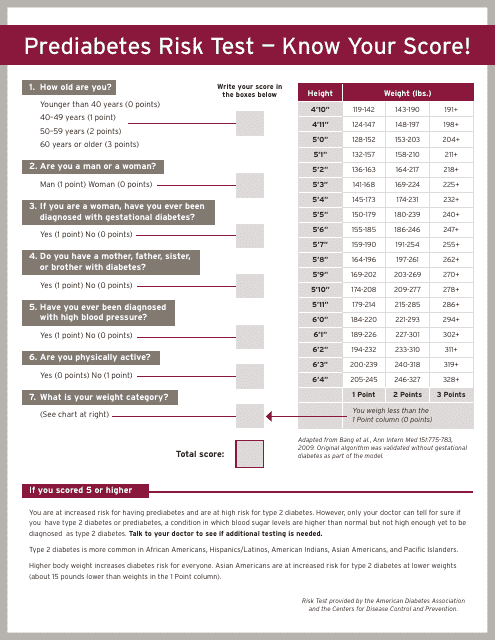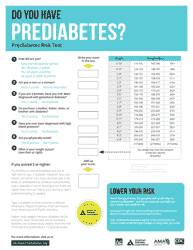Prediabetes Risk Test
A Prediabetes Risk Test is a tool used to determine if an individual has a higher chance of developing prediabetes, which is a condition where blood sugar levels are higher than normal, but not high enough to be classified as diabetes. This condition often precedes type 2 diabetes. The risk test usually involves a series of questions about one's age, gender, weight, lifestyle, and family history of diabetes. The purpose is to identify people who may be at risk so they can make lifestyle changes to prevent or slow the onset of diabetes.
FAQ
Q: What is a Prediabetes Risk Test?
A: A Prediabetes Risk Test is a medical examination or a self-assessment tool to gauge the likelihood of developing prediabetes, a health condition characterized by blood sugar levels higher than normal but not high enough to be diagnosed as diabetes.
Q: Who should take a Prediabetes Risk Test?
A: Individuals who are overweight, are 45 years old or older, have a close family member with type 2 diabetes, lead a sedentary lifestyle, have ever had gestational diabetes or given birth to a baby who weighed more than 9 pounds, and are of certain racial or ethnic groups may be more likely to have prediabetes and should consider the Prediabetes Risk Test.
Q: Is Prediabetes Risk Test accurate?
A: Prediabetes Risk Tests are a useful tool to identify individuals at risk, but they are not 100% accurate. A formal medical evaluation, including a blood test, is necessary to confirm a prediabetes diagnosis.
Q: How can I lower my prediabetes risk?
A: Several lifestyle modifications can lower your prediabetes risk: maintaining a healthy weight, incorporating physical activity into your daily routine, eating a balanced diet high in fiber and low in processed foods and added sugars, controlling your blood pressure and cholesterol levels, and quitting smoking if you smoke.
Q: Is prediabetes reversible?
A: Yes, prediabetes is often reversible. With lifestyle changes such as losing weight, eating healthily, and becoming more physically active, many people can return their blood glucose levels to normal.
Q: What happens if prediabetes is not treated?
A: If left untreated, prediabetes may progress into type 2 diabetes. This can lead to serious health issues like heart disease, stroke, kidney damage, and vision loss. Therefore, it's crucial to manage prediabetes as early as possible.




